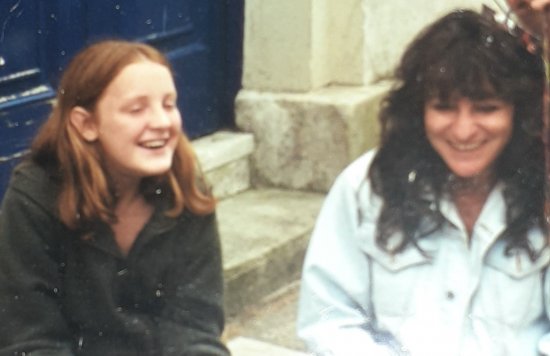Photograph: Karen Simpson with her daughter Rachael
Terminal agitation isn’t something we were aware of nor ever heard of before but it ravaged our final days with our beloved daughter. It stole her sanity and nearly took ours too.
Finding the Words
So much went through my mind: how do we tell loved ones, friends or colleagues that Rachael’s death was horrific, that we lost our daughter in mind and spirit before her physical self. How do we explain to her husband who was also battling a recent diagnosis of an aggressive cancer himself, that his wife had lost her mind before she lost her fight for life … how do we explain to her young sons that their mummy was gone.
What do l tell my colleagues when I return to work? Do l follow my husband’s softer explanation or share the cold stark truth? Do l risk upsetting others by talking about our experience or please everyone and tell them Rachael fell asleep and passed peacefully?
Adjusting to the Shock
Colleagues who l was close to had remained in contact during my daughter’s illness so it was no shock when told I them that Rachael had died. I received messages, cards and flowers from many people at the time.
By the time l returned to work, it was at the beginning of lockdown and l was straight in to isolation and remote working from home, re-learning my role and learning how to master MS Teams and Zoom. I must admit, I was lost in a haze. My role as carer, mum and nannie had disappeared.
The Loneliness of Grief
The pandemic was our new reality in grief and l grieved with every loss l heard on the news. How was l going to cope with feeling so totally isolated while working alone at home and grieving? Did anyone consider how isolating this was and was l ready to share my emotions regarding how l felt? It was completely new territory for us all. I was lost and felt all alone. People meant well saying “call me, message me, l’m here for you.” But they had not lived through the storm of cancer consuming their child before their eyes, of living without hope. It wasn’t their fault - they hadn’t caused it. So I sat alone, emotionally beaten and broken.
I felt so inept when it came to making ‘small talk’ ahead of meetings when people had cameras on or off. My isolation was compounded. I realised that very few staff knew where l had been or what l had experienced. Or how deeply unhappy and at a loss I was feeling. It was like l had been in a ‘time warp’ and returned many years after an event not knowing who l was.
To bereaved colleagues, I say, don’t be upset when it feels like no one at work remembers the passing of your loved one – that’s the nature of the business of grief.
I dreaded each new day and hoped for a reason not to work. And yet l knew l had to ‘fake it to make it’ or l’d simply fall apart. It wasn’t an option - I was and I still am considered the ‘mortar holding all the bricks together’ in my family and needed by loved ones to get through the days ahead.
Support and Joint Experience
What helped me most of all was a dear colleague whose mother was in the same hospice ward where my daughter had been weeks earlier. We ‘knew’ and we ‘understood’ the path that each of us was on. We sent loving notes, prayers and expressed our care and concern for each other’s lives and loss. That’s helped me so much. When you know loss, you can empathise. In my experience, unless you have walked in another person’s shoes, you cannot tell them how to tie their shoelaces!
Be Sensitive – Tread Carefully
Life can be a very cruel existence. People can miss the mark in their supposed well-intentioned remarks. Medical staff and other practitioners can make huge mistakes – it won’t bring back those we have loved and lost. Talking helps - but only when the person asking is really wanting to be there and to listen. Count your blessings daily – remember the good times before illness strikes and actively not just listen but hear what is being said.
So what would I say to people supporting bereaved colleague? I would say, ask what a bereaved colleague might need, never assume. Managers, remember when sending a team email about your colleague’s loss, to remove the bereaved person from this list – they will not want to find the email sitting in their in-box when they return to work.
I was warmly welcomed back to the team - although Rachael was mentioned, there was only stilted conversation and it felt like she had become the ‘Elephant in the Room’.
So don’t shy away or avoid a bereaved colleague because you are feeling uncomfortable. Remember, they will be feeling far worse and avoiding their loss will only add to their distress.
Allow us to speak about the person we have lost. It helps us to process what has happened and to keep our memories alive.
If we cry, then we cry. If you cry, we both cry. We are human and we are still alive and life must go on.
Reach out to the person and simply say that you do not have the right words; just acknowledge their loss; ask if there is something that you can do for them.
Do not be scared of their grief – reach out, cook or bake something for them.
Just bear in mind, you probably cannot make it worse – and you might even make it feel better for a time!
Ode to Rachael 11 March 1986 – 21 January 2020
